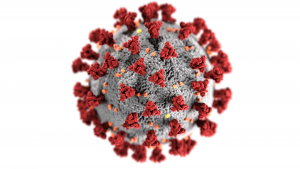 Antibody Engineering & Therapeutics, held in December 2021, offered many opportunities to hear exciting and informative presentations by experts in the field. We are pleased to present here a summary of a plenary lecture by Prof. Kristian Andersen (Scripps Research Institute), kindly written by Dr. Czeslaw Radziejewski.
Antibody Engineering & Therapeutics, held in December 2021, offered many opportunities to hear exciting and informative presentations by experts in the field. We are pleased to present here a summary of a plenary lecture by Prof. Kristian Andersen (Scripps Research Institute), kindly written by Dr. Czeslaw Radziejewski.
Untangling Pandemics in a Data-Driven World. The Evolution of SARS-CoV-2.
Kristian Andersen, Professor of Immunology and Microbiology, Scripps Research Institute
Professor Andersen’s lab conducts genomic epidemiology of different viruses using miniaturized PCR testing and large-scale genomic sequencing. Previously, his lab studied Lassa, West Nile, Ebola, and Zika viruses, and now the lab is examining SARS-CoV-2. The goal of the research to understand the emergence of new viruses and their local transmission,[1] as well as the evolution and spread of these viruses. In order to understand connectedness of the sequences, samples of virus are taken from the infected populations, then viruses are sequenced and analyzed.
SARS-CoV-2 was first detected in December 2019 in people who frequented the Wuhan Huanan market in Guangdong province, China. Based on large-scale sequencing, it was possible to estimate that the epidemic started in November 2019. SARS-CoV-2 is remarkably similar to SARS-CoV-1 in terms of the receptor in humans (ACE2), the animal reservoir (bats), and the fact that both are associated with wet markets.[2] The number of introductions in humans is at present unknown and any intermediate hosts are still also unknown. For SARS-Cov-1 the intermediate hosts were civets and raccoon dogs. Curiously, both viruses were introduced into humans in the month of November, SARS-Cov-1 in 2002, SARS-Cov-2 in 2019. Since 2002, trade and farming of wild animals have decreased in China, so the risk of multiple spillover was reduced. A farm in Hubei was previously found to have animals infected with SARS-CoV-1. Viral sequences determined in animals were very similar to those found in humans infected with SARS-Cov-1. The same farm recently had civets infected with SARS-CoV-2.
Since 1965, nine different coronaviruses have emerged in human population. Coronaviruses are part of Sarbecoviruses, which are widespread in Southeast Asia. Horseshoe bats are also widespread in that region and they are a reservoir of Sarbecoviruses. SARS-CoV-2 spreads easily and, unlike a seasonal influenza, it can infect both upper and lower parts of the respiratory system as well as other organs. High infectivity of many variants of CoV-2 can be attributed to the presence of the receptor binding domain (RBD) and also the presence of a polybasic cleavage site that allows the spike protein to be processed into two subunits and facilitates fast and widespread infection. The SARS-CoV-2 RBD is similar to the RBD of other viruses that infect animals such as bats and pangolins. SARS CoV-2 shows a very high rate of evolution, which in the past two years has resulted in multiple variants.[3] New variants have rapidly displaced the old ones. Omicron, which presumably emerged as a result of immune escape, has an extremely mutated lineage. For example, it has 40 mutations in the spike protein compared to original virus, most of which appears on the outside RBD of the spike protein. The mutations may lead to further optimization of binding to AC2, but also potentially usage of a coreceptor is involved. The spread of omicron is much faster than other variants. This variant is cable of causing new infection and reinfection. Almost entire the human population is susceptible to omicron infection, and SARS-CoV-2 now appears to be endemic.
In summary, SARS-Cov-2 is a fast-evolving virus and several factors such as evolutionary rate, mutational supply, mutational tolerance will determine its further evolution. However, we now have tools to fight the pandemics, including vaccines, anti-viral drugs, rapid tests, masks and better understanding of the virus.
1. Zeller et al. Emergence of an Early SARS-CoV-2 Epidemic in the United States. Cell 184(19):4939-4952, 2021. DOI: 10.1016/j.cell.2021.07.030.
2. Holmes et al. The Origins of SARS-CoV-2: A Critical Review. Cell 184(19):4848-4856, 2021. DOI: 10.1016/j.cell.2021.08.017.
3. Washington et al. Emergence and Rapid Transmission of SARS-CoV-2 B.1.1.7 in the United States. Cell 184(10):2587-2594, 2021. DOI: 10.1016/j.cell.2021.03.052.

